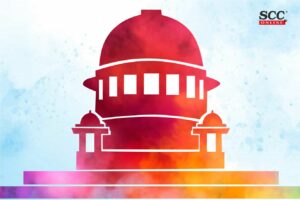Supreme Court: In the case where the Election Commission of India (EC) had sought a direction restraining the media from reporting on court proceedings after Madras High Court made certain oral remarks attributing responsibility to the EC for the present surge in the number of cases of COVID-19, due to their failure to implement appropriate COVID-19 safety measures and protocol during the elections, the bench of Dr. DY Chandrachud* and MR Shah, JJ has refused to restrain the media from reporting on Court proceedings and made a strong case in favour of Open Court and freedom of press.
Unmissable quotes
This Court stands as a staunch proponent of the freedom of the media to report court proceedings. This we believe is integral to the freedom of speech and expression of those who speak, of those who wish to hear and to be heard and above all, in holding the judiciary accountable to the values which justify its existence as a constitutional institution.
Citizens have a right to know about what transpires in the course of judicial proceedings. The dialogue in a court indicates the manner in which a judicial proceeding is structured. Oral arguments are postulated on an open exchange of ideas. It is through such an exchange that legal arguments are tested and analyzed. Arguments addressed before the court, the response of opposing counsel and issues raised by the court are matters on which citizens have a legitimate right to be informed.
Courts must be open both in the physical and metaphorical sense. Save and except for in-camera proceedings in an exceptional category of cases, such as cases involving child sexual abuse or matrimonial proceedings bearing on matters of marital privacy, our legal system is founded on the principle that open access to courts is essential to safeguard valuable constitutional freedoms.
An open court proceeding ensures that the judicial process is subject to public scrutiny. Public scrutiny is crucial to maintaining transparency and accountability. Transparency in the functioning of democratic institutions is crucial to establish the public‘s faith in them. Public scrutiny fosters confidence in the process. Public discussion and criticism may work as a restraint on the conduct of a judge. An open court serves an educational purpose as well. The court becomes a platform for citizens to know how the practical application of the law impacts upon their rights.
An open court and transparent dispensation of justice in all its modalities, is an end in itself.
Freedom of speech and expression extends to reporting the proceedings of judicial institutions as well. Courts are entrusted to perform crucial functions under the law. Their work has a direct impact, not only on the rights of citizens, but also the extent to which the citizens can exact accountability from the executive whose duty it is to enforce the law.
The world is adapting to technology at a pace which is often difficult to catalogue, and many of our citizens are becoming digital natives from a young age. It is understandable that they will look towards modern forms of media, such as social media websites and applications, while consuming the news. This, understandably, would also include information reported about the functioning of courts. Hence, it would do us no good to prevent the new forms of media from reporting on our work.
Citizens are entitled to ensure that courts remain true to their remit to be a check on arbitrary exercises of power. The ability of citizens to do so bears a direct correlation to the seamless availability of information about what happens in a court during the course of proceedings. Therein lies the importance of freedom of the media to comment on and write about proceedings.
Lokmanya Balgangadhar Tilak’s Trial
The Court also cited the Lokmanya Balgangadhar Tilak‘s first trial for sedition to highlight that media reporting has operated alongside formalized court processes for close to a century. “Court proceedings in colonial India, especially sedition trials, were also sites of political contestation where colonial brutality and indignity were laid bare.”
The widespread reportage on Lokmanya Balgangadhar Tilak‘s first trial for sedition highlighted the variance in procedural laws and rights denied to Indian undertrials, as he struggled to access legal aid and was convicted in spite of a non-unanimous verdict of the jury. Lokmanya‘s poignant words, while recorded by the order as a formalized process of sentencing, were circulated far and wide by anti-colonial publications which fueled India‘s struggle for freedom:
“In spite of the verdict of the Jury I maintain that I am innocent. There are higher Powers that rule the destiny of men and nations and it may be the will of Providence that the cause which I represent may prosper more by my suffering than by my remaining free.”[1]
These words incidentally also adorn the plaque outside that very courtroom in the Bombay High Court to this day.
Madras High Court’s remarks that led to this order
During the course of the hearing, the Madras High Court had allegedly orally observed that the EC is “the institution that is singularly responsible for the second wave of COVID-19” and that the EC “should be put up for murder charges”.
[Chief Election Commissioner of India v. M.R Vijayabhaskar, 2021 SCC OnLine SC 364, decided on 06.05.2021]
*Judgment by: Justice Dr. DY Chandrachud
Appearances before the Court:
For EC: Senior Advocate Rakesh Dwivedi and Advocate Amit Sharma
[1] Emperor vs Balgangadhar Tilak, (1908) 10 BOMLR 848 (Bombay High Court)

